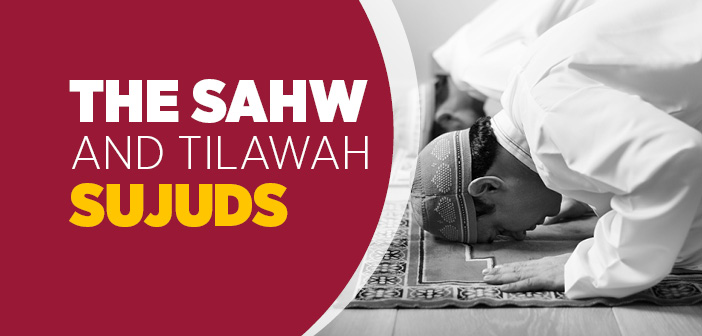What is sahw? What is tilawah sujuds?
I. Sahw Sujud
The word sahw means to forget, to make a mistake, to be unaware. The ‘’Sahw Sujud’’ is needed when one or more sunnah muakkadahs or when two or more small sunnahs are not carried out. If the case is that is just has not been carried out, the sahw sujud is made before saying the salam. If the mistake in question is made by doing something extra or making a mistake and leaving something out, then the sujud is made after the salam.
There are eight sunnah muakkadahs of salat: To read a surah, to pay attention to whether the reading is read out loud or quietly, to make two or more takbirs besides the starting takbir, to say two or more ‘’semiallahu liman hamidah’’, to read the first tashaddud, to sit for this, the second tashaddud.
How is the sahw sujud performed?
There are two types of sahw sujud; the one that is made before saying the salam (qabli) and the one that is made after the salam (ba’di). While in prayer, it is required that are sahw sujud be made after saying the salam when an extra action is made whether it is to do with the prayer or not. However the action made that is not related with the prayer must not be carried out too much, because if this is the case, the salat will be deemed batil.
When someone is in prayer and they become suspicious that they have not implemented an action of the prayer, they accept that they in fact have not implemented it and make a sahw sujud after saying the salam. This is for the person who does not continuously repeat this type of situation. But if this happens frequently the person will take this into account and they will not do the thing they are suspicious of, they will make the sahw sujud after saying the salam.
The sahw sujud is required to be performed by these eleven people:
- The person who is suspicious of whether or not they have said the salam,
- The person who is suspicious about whether or not they have made their sahw sujud befor saying the salam,
- The person who is suspicious about whether they have made one or two sujuds,
- A person who reads the qiraat in the last two rakahs of a four rakah prayer or the third rakah prayer of the maghrib prayer,
- The person who goes from one surah to the other,
- The person who involuntarily vomits, in a clean manner, while in prayer,
- The person who reads the qiraat out aloud in a prayer where the qiraat is read quietly or reading the qiraat in a low voice in a prayer where it is being read out aloud. The limit of this is reading an ayah from Fatiha or another surah.
- The person who repeats the reading of the qiraat so that it is in accordance with the sunnah-in terms of it being read aloud or quietly-,
- Reading in a tone where only the person reading can hear it, in a prayer that is read out loudly, or reading out loudly so that the person next to you can hear in a quiet prayer,
- Implementing a small action such as looking somewhere while in prayer,
- The imam placing a follower of him to pray at his right side.
There are five fardh for the sahw sujud that is made after giving the salam: Intention, the first sujud, the second sujud, sitting between then two sujuds, giving salam. To make takbir and read tashaddud is sunnah. For the sahw sujud that is made before the salam, besides the intention and salam, it is just like the next sujud.
It is considered haram to bring forward the sujud that is meant to be made after the salam, and it is makruh to delay the first sujud to after the salam. In both situations the salat will not be spoiled.
For the person who catches up to the jamaat a bit late, if they have caught up with one rakah of the salat, they will make the sujud before the salam with the imam. For the sujud that is made after the salam, they will make it after they have given salam, if they do it before this the salat will be spoiled. In the case that they can not catch up to a rakah with the imam, if they make a sujud before the salam with the imam the salat will be spoiled.
If a person makes a mistake while they are following the imam, they will not perform the sahw sujud before or after the sujud. However they will have to do the sahw sujud if they make a mistake while they are performing the qaza prayer for the part they have not prayed with the imam.
In the situation that the sahw sujud is made due to leaving out one of the fazilahs or light sunnahs concerning the salat, the salat will be considered batil.
The salat will not be spoiled even if the sujud to be made after the sujud is intentionally not made. It can be made when it is remembered even if a long time has passed.
The salat will be spoiled if the sujud to be made before the salam is not made in the case that the three sunnahs have been left out and if a long time has passed or if the person leaves the mosque. The salat will not be spoiled in the case that the sujud is not made for leaving out two small sunnahs.
The prayer of the person who intentionally does not carry out one of the rukuns of prayer will be spoiled. The prayer of the person who mistakingly leaves out a rukun and if a long time passes it will be spoiled, it will not be spoiled if the person makes up for this prayer.
II. Sujud Tilawah
The term tilawah means reading. The term Sujud Tilawah meand ‘’reading sujud’’. As a term, Sujud Tilawah means the mukallaf carrying out the sujud that is sunnah. Who must carry this out; the person who reads or hears one of the eleven sujud ayahs in the Qur’an.
The Sujud Tilawah is carried out in the form of one sujud without the starting takbir and the salam. The Sujud Tilawah is carried out by the person who reads or listens to the reading of one the sujud ayahs.
The listening person makes the sujud with these conditions:
- If the person is listening to the person who has read the sujud ayah with the intention of learning the Qur’an,
- If the person who is reading is able to act as an imam,
- If the person reading has carried out the conditions of the prayer,
- If the person reading is not reading in order to announce it to everyone,
It is considered makruh if someone does not make the sujud even if it jaiz to make a sujud in that waqt, to just read the sujud ayahs, to intentionally read the sujud ayah in the fardh prayer.
It is considered mandub for the imam to read the sujud ayah out aloud in prayers where the qiraat is quiet, to read the sujud ayah before the ruqu even if it is from another surah.
The person reading will repeat the sujuds every time they repeat the sujud ayah. However people who are occupied with the learning and teaching of the Qur’an do not have to repeat them.
It is considered makruh to make the sujud with the reason of receiving good news or due to an earthquake etc. Or any other frightening reason. To pray in these types of situations is considered mandub.
Source: Fiqh1 (According To The Maliki School Of Islamic Law), Erkam Publications





